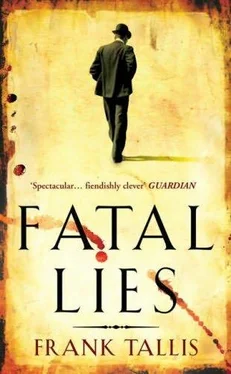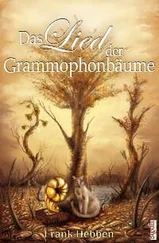Frank Tallis - Fatal Lies
Здесь есть возможность читать онлайн «Frank Tallis - Fatal Lies» весь текст электронной книги совершенно бесплатно (целиком полную версию без сокращений). В некоторых случаях можно слушать аудио, скачать через торрент в формате fb2 и присутствует краткое содержание. Жанр: Исторический детектив, на английском языке. Описание произведения, (предисловие) а так же отзывы посетителей доступны на портале библиотеки ЛибКат.
- Название:Fatal Lies
- Автор:
- Жанр:
- Год:неизвестен
- ISBN:нет данных
- Рейтинг книги:3 / 5. Голосов: 1
-
Избранное:Добавить в избранное
- Отзывы:
-
Ваша оценка:
- 60
- 1
- 2
- 3
- 4
- 5
Fatal Lies: краткое содержание, описание и аннотация
Предлагаем к чтению аннотацию, описание, краткое содержание или предисловие (зависит от того, что написал сам автор книги «Fatal Lies»). Если вы не нашли необходимую информацию о книге — напишите в комментариях, мы постараемся отыскать её.
Fatal Lies — читать онлайн бесплатно полную книгу (весь текст) целиком
Ниже представлен текст книги, разбитый по страницам. Система сохранения места последней прочитанной страницы, позволяет с удобством читать онлайн бесплатно книгу «Fatal Lies», без необходимости каждый раз заново искать на чём Вы остановились. Поставьте закладку, и сможете в любой момент перейти на страницу, на которой закончили чтение.
Интервал:
Закладка:
A line of hunched white backs-goose-pimpled and shivering-the relentless hammering of the old pipes…
Drexler had rushed over to claim a vacant basin. While he was splashing tepid water onto his face, he overheard the two boys next to him speaking in hushed tones.
“Murdered… in the lodges… there for a whole day before they found him.”
“What did you say?” Drexler had asked.
The boy next to him had been about to reply, but was silenced by a prefect who struck his calves with a riding crop (carried especially for this purpose).
“Shut up,” the prefect had shouted. “You're worse than a bunch of fishwives!”
By midmorning Drexler had been able to establish that there hadn't been a murder at all but a suicide-and that the dead master was Herr Sommer.
This news saddened Drexler, as he had been rather fond of Herr Sommer. When, in the previous year, Drexler had been experiencing difficulties understanding algebra, Herr Sommer had invited him to his rooms and given him extra tuition. Away from the classroom the mathematics master was much more relaxed-much more amusing. He had once told Drexler an extremely risque joke about a priest and a choirboy. “Our secret,” he had said confidentially. Toward the end of that year, Sommer's invitations became less frequent. He seemed to have found a new favorite-Thomas Zelenka. Drexler hadn't minded very much. In truth, he had begun to find Herr Sommer's company less diverting-especially after he'd made the acquaintance of Snjezana.
Drexler tried to swallow a kidney but didn't have the stomach for it. He pushed it back onto the spoon with his tongue and decided he wasn't hungry.
Everything was beginning to unravel.
Zelenka, Becker, Sommer…
Even Wolf hadn't been himself lately. He had been summoned to the headmaster's office on Thursday and had refused to say why.
“Did he ask about Perger?”
“Just forget Perger, will you!” Wolf had replied angrily, “He ran away, for God's sake! And no one gives a shit where he's gone!”
Drexler was no longer sure whether he could trust Wolf. Greater leniency was shown in courts of law to criminals who confessed their misdeeds and showed remorse. Was that what Wolf was up to?
Before Drexler left the dining hall he went over to another boy and said: “I'm not feeling well. If Osterhagen asks where I am, tell him I've gone to the infirmary.”
It was not difficult to leave the school unnoticed at that time of day and soon he was walking eastward, cross-country toward Vienna. He gave Aufkirchen a wide berth, but could still see the onion dome and spire of the Romanesque church. For a moment he was tempted to change direction. Snjezana would probably be lying on her bed, smoking, and reading one of her novels. He could see her one last time. What harm would it do?
“No,” Drexler said out loud, lengthening his stride. “I must get this over with.”
He continued walking for more than an hour and eventually came to a tiny hamlet-no more than a cluster of ramshackle dwellings huddled together on a rough track. Drexler followed the path around the base of a hillock, and in due course it took him to a much wider road. He paused in order to get his bearings.
A low, weak sun hovered above the horizon. It was suspended in the sky like a communion wafer: a perfect, lustreless white circle. All around, crows were either taking off or landing, and the air reverberated with their raucous laughter.
Drexler stepped onto the road and continued his descent. Soon he came to another village. He had been to this place several times before but had never stayed very long. Although larger than Aufkir chen, it offered little in the way of entertainment. The inn was fairly respectable and a frequent destination for well-heeled patrons. His parents had taken rooms there once when they'd visited the school.
Opposite the inn was an impressive baroque church, painted bright yellow, and next to this was the police station. It was not a very auspicious building. Indeed, it might have been described more accurately as an outpost-or guardhouse.
When Drexler opened the door, he was struck by the modesty of the interior: roughcast walls, a single paraffin lamp, and a battered table-behind which sat a big-boned constable with orange hair. He was staring glumly at a silent telephone.
Drexler s appearance seemed to raise his spirits.
“Hello,” he said cheerfully. “Are you from the school?”
“Yes,” Drexler replied.
“You've come a fair way-lost, are you?”
“No. I've come to report something.”
“What's that, then?”
“A murder.”
The constable's expression changed. “A murder?”
“Yes,” said Drexler. “I shot a boy called Perger. I want to confess… I want to make a statement.”
72
Liebermann watched the late-afternoon traffic rolling by: fiacres, omnibuses, trams, and an impressive four-horse carriage with a gold crest emblazoned on its black lacquered door. The occupant-a visiting royal of some description-could just be discerned inside, a shadowy figure craning to get a better view of the opera house.
It was a grand building, constructed in the neo-Renaissance style. However, when it had been completed, the emperor had been overheard agreeing with one of his aides concerning the appearance of the new opera house: it looked… a trifle low, perhaps? The architect dutifully hanged himself, and two months later his collaborator died of a heart attack. Thereafter, Franz Josef only praised the work of civic artists. “Beautiful, beautiful…” became his unvarying response.
Inside the opera house, the orchestra and singers were rehearsing Siegfried. Liebermann had discovered this by talking to the doorman, who-for two kronen-was easily persuaded to give him advance notice of the musicians’ imminent departure.
The young doctor had stationed himself by one of the two stone fountains that flanked the loggia. He had stood by this particular fountain on numerous occasions but had never troubled to examine it closely. The female figure seated at the summit was the legendary siren Lorelei, and below the elegant bowl were three sentries representing love, grief, and vengeance. Liebermann laughed bitterly. The themes dramatized his circumstance perfectly.
He had fallen in love with Trezska: he had been beguiled by her beauty, virtuosity, and mystery. In the virid halo of an absinthe stupor, she was as irresistible and strange as Lorelei. Yet there was a natural order of things, a universal logic, which insisted that love must always-at some point-be associated with grief. Small partingswhich pained the heart-were a mere prelude to the great sundering that awaits all lovers. Deceit, calamity, death-grief could not be postponed indefinitely. Liebermann had already started to grieve- even though the outcome of his inquiries was still uncertain. It did not feel premature. He was not psychic, but he wasn't stupid either. Love had been followed by grief, and he wondered whether vengeance was now waiting in the wings. Presumably, vengeance could come only at his behest. Would he summon that dark spirit, and become acquainted with all three personifications of the operatic triumvirate?
Liebermann was familiar with the legend of Lorelei through Liszt's setting of an eponymous poem by Heine. He recollected the opening bars: yearning, ambiguous harmonies, falling for a moment into silence-and then the voice, entering: “Ic h wei? nicht, was soil es heieuten,
Da? ich so traurighin.” I do not know what it means That I should feel so sad.
It was a romantic tale of men fatally fascinated by beauty. Liebermann looked up at the Rhine maiden. She was seated on a decorated pedestal, her body half-turned-carelessly exposing her breasts. She was slim-her arms delicately poised-and her corrugated hair flowed off her shoulders. Her expression was wickedly indifferent to masculine worship.
Читать дальшеИнтервал:
Закладка:
Похожие книги на «Fatal Lies»
Представляем Вашему вниманию похожие книги на «Fatal Lies» списком для выбора. Мы отобрали схожую по названию и смыслу литературу в надежде предоставить читателям больше вариантов отыскать новые, интересные, ещё непрочитанные произведения.
Обсуждение, отзывы о книге «Fatal Lies» и просто собственные мнения читателей. Оставьте ваши комментарии, напишите, что Вы думаете о произведении, его смысле или главных героях. Укажите что конкретно понравилось, а что нет, и почему Вы так считаете.












